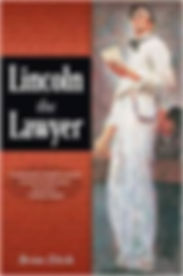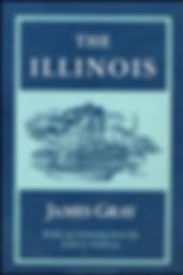Corn Kings and One-Horse Thieves
Odds & ends

Illinois past and present, as seen by James Krohe Jr.
The Corn Latitudes
Hoxsey's Army
Illinois legislators get their cults confused
Illinois Times
June 15, 1979
I am not a religious man, but am more supportive of religious freedom than a great many believers in religion. Some of those believers have been members of the Illinois General Assembly. The bill discussed here was never seriously enforced, nor was it meant to be by most of the members who voted for it, who hoped only to Show Their Concern. But the affair left me fearful that this kind of illiberality might someday be harnessed to a more seriously intended purpose.
A side note: This piece was reprinted by Liberty magazine, published by the Religious Liberty Association of America and the Seventh-day Adventist Church.
It is often joked that no one's life or property is safe when the Illinois General Assembly is in session. As recent events have shown, one’s liberty isn't too safe either, and it's no laughing matter. The event in point was the passage by the Illinois House by a vote of 95 to 41 of a resolution authored bv Rep. Betty Hoxsey (R-Ottawa) that creates a temporary six- member commission to investigate what Hoxsey has called, “illegal activities of religious cults who are coercing our children to join up with them.”
Such a commission would trample over all the First Amendment guarantees of freedom of religion; indeed, it is so egregiously unconstitutional that some observers have been able to muster only a laugh in response to it. I did the same at first. But ninety-five presumably sober men and women voted for it. and I was reminded that even little children, if handed a box of matches and left unattended, can burn down a house even when they don't mean to.
The targets of Hoxsey’s wrath are plainly the People's Temples and Reunification Churches of the world, but the definitions under which her commission would operate are alarmingly fuzzy. "Any true religion doesn't have to worry about investigations into illegal activities." she is reported to have said, "because they would not commit any illegal acts." By "true" religions Hoxsey presumably means established religions: Judaism. Catholicism, the major Protestant denominations—in short, the ones that can afford lobbyists.
But every one of these bodies, of course, began as a cult in bitter and often violent opposition to the "true" religions of their day. Religious truth is a celestial matter, not a civil one, and attempts to sanctify "true" religions by statute by proscribing activities of dissident cults have generally led to unhappy results. It is worth remembering that one of the earlier chairmen of a commission to investigate illegal cult activities was named Pilate.
What troubles Hoxsey is not what is done in the name of religion but who does it. One wonders, for example, if she would brook a cultist threatening a child with the agonies of the flesh and spirit unless he takes part in the cult’s rites, forcing him (sometimes under threat of physical punishment) to memorize the sayings of its leader, and teaching him that the cult’s laws are to be held above those of the state, indeed, that if necessary they must be obeyed even if it means death? One suspects that such a program would fall under the Hoxsian definition of illegal cult activities with room to spare. But what I've described may be seen any week, in any town, in any Sunday school class. One person's brainwashing is another's catechism.
What then distinguishes a cult and a religion? Belief in the Bible? Jim Jones was a Bible-thumping preacher. Bizarre ritual? To the unbeliever, the rites of the Catholic Church arc of surpassing strangeness. Respectability? There is no more upright citizen than a Mormon, but except for the fact that he wears suits, he is as unorthodox as any Hare Krishnan. If we may presume to read Hoxsey’s mind, we might attempt this definition: A cult is a small, unpopular group of people who do not think (and sometimes dress or speak) like most other people, who often display a discomfiting belief in the correctness of their views and who thus sometimes do things that are against the law.
That definition could easily fit the General Assembly.
It is useful to recall that the United States was founded in large part by cults (the Pilgrims are perhaps the best known of these) who had fled here or were driven here by the Hoxseys of Europe. Because of the miscellaneous nature of our religious heritage we escaped the domination of the state by monolithic Catholic and Protestant churches of Europe. In its place we adopted a more flexible rule by which church and state each agreed to let the other punish its sinners in its own ways.
As a citizen I may think it abominable (to pick just one example) for a priest to counsel a scared and poor pregnant teenager against aborting an unwanted child under penalty of perdition under the doctrine that while Life is sacred, people are not. But 1 will not be party to a law against him. I do not presume, as Hoxsey does, to mediate between God and humans.
1 trust my motives will not be misunderstood. I regard all cults as obnoxious, whether they are peopled by Moonies or Methodists: the only difference I can detect between religions and cults is that cults usually don't own their own Sunday school buses. But one can't pass laws against people being ignorant or gullible or fearful. If cultists kidnap or trespass or steal, there are civil remedies. To Hoxsey and her ninety-four colleagues who think otherwise. I offer this advice: Stay out of religion. You lack the wisdom, and besides, it's none of your business anyway. ●
SITES
OF
INTEREST
Essential for anyone interested in Illinois history and literature. Hallwas deservedly won the 2018 Lifetime Achievement Award from the Illinois State Historical Society.
One of Illinois’s best, and least-known, writers of his generation. Take note in particular of The Distancers and Road to Nowhere.
See Home Page/Learn/
Resources for a marvelous building database, architecture dictionary, even a city planning graphic novel. Handsome, useful—every Illinois culture website should be so good.
The online version of The Encyclopedia of Chicago. Crammed with thousands of topic entries, biographical sketches, maps and images, it is a reference work unmatched in Illinois.
The Illinois chapter of the American Institute of Architects in 2018 selected 200 Great Places in Illinois that illustrate our shared architectural culture across the entire period of human settlement in Illinois.
A nationally accredited, award-winning project of the McLean County Historical Society whose holdings include more than 20,000 objects, more than 15,000 books on local history and genealogy, and boxes and boxes of historical papers and images.
Mr. Lincoln, Route 66, and Other Highlights of Lincoln, Illinois
Every Illinois town ought to have a chronicler like D. Leigh Henson, Ph.D. Not only Lincoln and the Mother road—the author’s curiosity ranges from cattle baron John Dean Gillett to novelist William Maxwell. An Illinois State Historical Society "Best Web Site of the Year."
Created in 2000, the IDA is a repository for the digital collections of the Illinois State Library and other Illinois libraries and cultural institutions. The holdings include photographs, slides, and glass negatives, oral histories, newspapers, maps, and documents from manuscripts and letters to postcards, posters, and videos.
The people's museum is a treasure house of science and the arts. A research institution of national reputation, the museum maintains four facilities across the state. Their collections in anthropology, fine and decorative arts, botany, zoology, geology, and history are described here. A few museum publications can be obtained here.
“Chronicling Illinois” showcases some of the collections—mostly some 6,000 photographs—from the Illinois history holdings of the Abraham Lincoln Presidential Library.
I will leave it to the authors of this interesting site to describe it. "Chicagology is a study of Chicago history with a focus on the period prior to the Second World War. The purpose of the site is to document common and not so common stories about the City of Chicago as they are discovered."
Illinois Labor History Society
The Illinois Labor History Society seeks to encourage the preservation and study of labor history materials of the Illinois region, and to arouse public interest in the profound significance of the past to the present. Offers books reviews, podcasts, research guides, and the like.
Illinois Migration History 1850-2017
The University of Washington’s America’s Great Migrations Project has compiled migration histories (mostly from the published and unpublished work by UW Professor of History James Gregory) for several states, including Illinois. The site also includes maps and charts and essays about the Great Migration of African Americans to the north, in which Illinois figured importantly.
An interesting resource about the history of one of Illinois’s more interesting places, the Fox Valley of Kendall County. History on the Fox is the work of Roger Matile, an amateur historian of the best sort. Matile’s site is a couple of cuts above the typical buff’s blog. (An entry on the French attempt to cash in on the trade in bison pelts runs more than
2,000 words.)
BOOKS
OF INTEREST

Southern Illinois University Press 2017
A work of solid history, entertainingly told.
Michael Burlingame,
author of Abraham
Lincoln: A Life
One of the ten best books on Illinois history I have read in a decade.
Superior Achievement Award citation, ISHS Awards, 2018
A lively and engaging study . . . an enthralling narrative.
James Edstrom
The Annals of Iowa
A book that merits the attention of all Illinois historians
as well as local historians generally.
John Hoffman
Journal of Illinois HIstory
A model for the kind of detailed and honest history other states and regions could use.
Harold Henderson
Midwestern Microhistory
A fine example of a resurgence of Midwest historical scholarship.
Greg Hall
Journal of the Illinois
State Historical Society
Click here
to buy the book
Southern Illinois University Press
SIU Press is one of the four major university publishing houses in Illinois. Its catalog offers much of local interest, including biographies of Illinois political figures, the history (human and natural) and folklore of southern Illinois, the Civil War and Lincoln, and quality reprints in the Shawnee Classics series.
The U of I Press was founded in 1918. A search of the online catalog (Books/Browse by subject/Illinois) will reveal more than 150 Illinois titles, books on history mostly but also butteflies, nature , painting, poetry and fiction, and more. Of particular note are its Prairie State Books, quality new paperback editions of worthy titles about all parts of Illinois, augmented with scholarly introductions.
The U of C publishing operation is the oldest (1891) and largest university press in Illinois. Its reach is international, but it has not neglected its own neighborhood. Any good Illinois library will include dozens of titles about Chicago and Illinois from Fort Dearborn to
Vivian Maier.
Northern Illinois University Press
The newest (1965) and the smallest of the university presses with an interest in Illinois, Northern Illinois University Press gave us important titles such as the standard one-volume history of the state (Biles' Illinois:
A History of the Land and Its People) and contributions to the history of Chicago, Illinois transportation, and the Civil War. Now an imprint of Cornell University Press.




Reviews and significant mentions by James Krohe Jr. of more than 50 Illinois books, arranged in alphabetical order
by book title.
Run by the Illinois State Library, The Center promotes reading, writing and author programs meant to honor the state's rich literary heritage. An affiliate of the Library of Congress’s Center for the Book, the site offers award competitions, a directory of Illinois authors, literary landmarks, and reading programs.
